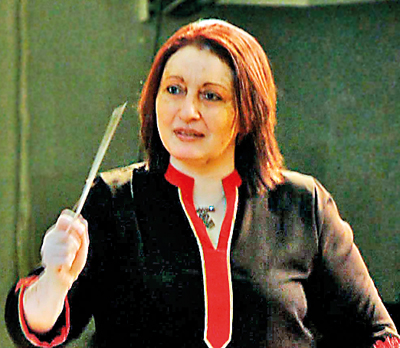“We Remember”: SOSL strikes a sombre note
View(s):
SOSL’s resident conductor, Dushyanthi Perera
The SOSL returns to its regular concert schedule this September, with a concert dedicated to the memory of those who lost their lives in the Easter attacks, and in aid of those who live in the aftermath.
“We Remember” takes place at the Lionel Wendt theatre on September 15 and is directed by the SOSL’s resident conductor, Dushyanthi Perera. The concert features music that reflects a range of human emotion and experience, from the heartbreaking Adagio for Strings by Samuel Barber, to the cheerfully optimistic Slavonic Dances by Dvorak.
Samuel Barber’s Adagio for Strings is a heart-rending piece at anytime, and an especially poignant choice for this concert. Arguably his best known work, the Adagio for Strings is at its core, a simple ascending motif that builds in intensity and texture to a breaking point, a wrenchingly emotional piece that holds all the sadness of the world.
Also in the programme is Mozart’s Symphony No. 40. The penultimate of his symphonies, the iconic 40th is one of only two that he wrote in a minor key. The slightly sombre mood of the opening movement, with its instantly recognizable almost ‘sighing’ theme often gives way to near-jubilant outbursts, only to return again to a darker mood. Written soon after the death of Mozart’s infant daughter Theresia, the entire work seems to shift in and out of the shadows—though never really being engulfed by them.
Three Slavonic dances by Dvorak (Op 46 no. 1 and 8, Op 72 no. 2) and Schubert’s Overture to Rosamunde make up the rest of the programme—cheerful works that exude a much-needed air of optimism and hope. Dvorak’s Slavonic dances were not really based on Slavic folk tunes, but inspired by the forms of Bohemian dances. The melodies themselves are completely original, and presented with traditional rhythm and structure to evoke the spirit of folk music.
Strangely, the piece we know as the Overture to Rosamunde, was never called that during Schubert’s lifetime. He knew it as the overture to Die Zauberharfe (The Magic Harp), another –rather disastrous–production for which he wrote incidental music. A publisher printed it with the incidental music for Rosamunde by mistake, and the overture was saved from obscurity. Consequently one of Schubert’s finest orchestral works gained much deserved popularity.
“We Remember” is sponsored by the Dr. Earle De Fonseka Trust. Tickets and box plan are available at the Lionel Wendt Theatre.
The print media sponsors for the show are the Sunday Times, Hi Magazine, Hi TV and the Daily Mirror, while electronic media sponsors are Yes FM, TV 1 & Legends 96.6. The Creative Partner is Wunderman Thompson.


